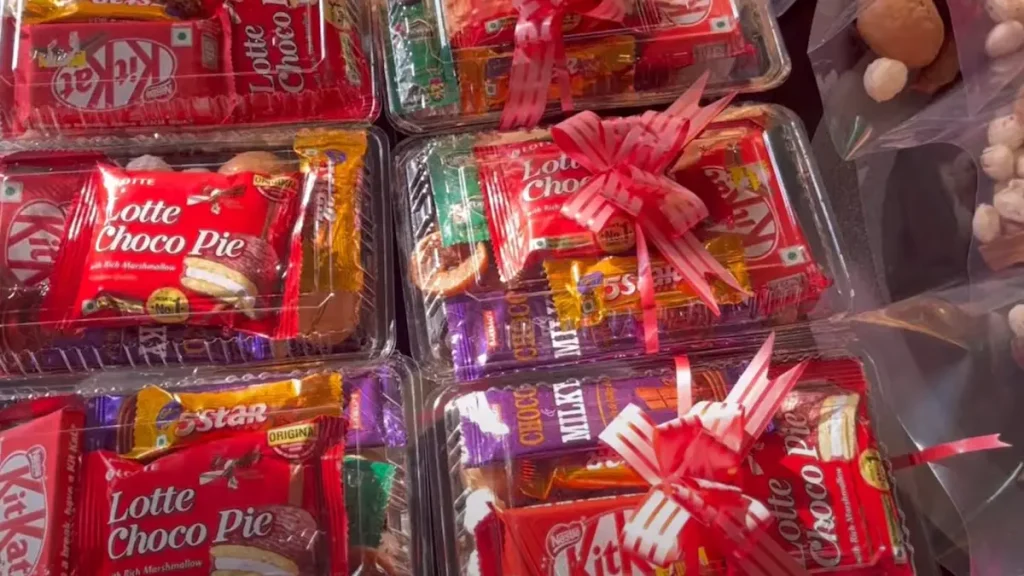
The festival of lights, Yam Panchak, popularly known as Tihar, has officially begun from Saturday afternoon, marking one of Nepal’s most celebrated festivals. The festival, which runs from Kartik Krishna Trayodashi to Kartik Shukla Dwitiya, started this year after 1:23 PM on Saturday, as the lunar calendar shifted from Dwadashi to Trayodashi tithi.
With the onset of Tihar, the market for Bhai Masala — the traditional mixture of dry fruits and spices exchanged during Bhai Tika — has come alive in major trading hubs such as Ason and Indra Chowk in Kathmandu.
Sharp Price Hike Frustrates Shoppers
This year, prices of Bhai Masala have nearly doubled compared to last year, causing concern among buyers.
Rajya Laxmi, a shopper from Dhapasi who came to Ason for Tihar shopping, said she was shocked at the sudden surge in prices.
“Every item has become twice as expensive as last year,” she complained. “Even basic festive items now cost too much.”
During Bhai Tika, sisters traditionally offer their brothers a symbolic gift consisting of cashews, raisins, almonds, coconuts, betel nuts, chocolates, and other dry fruits after applying tika. However, rising prices have left many sisters struggling to maintain the tradition.
Sunita Khatri from Balkot, Bhaktapur, also expressed disappointment, saying she could not purchase as much as she had planned due to the high prices.
Housewife Babita Basnet shared a similar concern:
“Last year, I could prepare masala for four brothers with the same amount of money. This year, it’s hard to manage even for two.”
Import Costs and Low Production Drive Prices Up
According to traders, reduced production and increased import costs have driven up the prices of spices and dry fruits.
Rajendra Oli, who has been running a spice shop in Balkot for five years, said prices of Bhai Masala items have risen by around 20 percent this year.
“Prices are up, and business is down,” he said. “The economic slowdown may also be affecting overall trade.”
Veteran trader Chandra Shrestha, who has been operating in Ason for over 50 years, said that in the past, sales were brisk in the days leading up to Bhai Tika, but now the retail price has increased by 10 to 15 percent due to higher import rates from India.
He added that cashews, fox nuts (makhana), and walnuts have become particularly expensive, while overall demand has dropped by about 20 percent compared to last year.
“Earlier, Ason used to be the only place to buy these items, but now that they’re available everywhere, our business has slowed,” Shrestha noted.
Changing Consumer Preferences
Locally produced items such as walnuts, corn, bananas, and rice flour (for chatamari) are gaining popularity. Packaged Bhai Masala Sets have also become a trend among younger customers.
Trader Suvarna Shrestha said the ready-to-use masala sets have made selling easier:
“Customers want convenience. When we sell pre-packed masala, it’s much faster and more efficient.”
Despite the convenience, Suvarna noted that overall sales are still lower than in previous years.
“Business has just started picking up. I hope it improves by Bhai Tika,” she added.
Online Shopping and Delivery Services on the Rise
Online orders for Bhai Masala are also increasing, with some retailers introducing home delivery services.
Sharmila Khatri, who has been trading at Ason for over 20 years, said foot traffic has visibly declined.
“Before, we could barely keep up with the rush. Now, we often just wait and watch,” she said.
Cultural Significance Remains Strong
Despite the economic pressure, the emotional and cultural essence of Bhai Tika — a celebration of love, duty, and protection between brothers and sisters — remains intact.
Markets in Ason, Indra Chowk, New Road, Kalanki, and Newar communities continue to bustle with buyers seeking traditional items like cashews, raisins, betel nuts, and coconuts.
Import Figures Show Major Spike
According to the Department of Customs, Nepal imported 143,102 kg of Bhai Masala-related goods worth Rs 1.62 billion by the end of Ashoj (mid-October).
This included:
- Cashews worth Rs 178 million (187,653 kg)
- Almonds worth Rs 237.9 million (111,000 kg)
- Walnuts worth Rs 246.4 million (347,160 kg)
- Pistachios worth Rs 40.6 million (200 kg)
- Betel nuts worth Rs 470.9 million (1.67 million kg)
- Cloves worth Rs 267.3 million (77,827 kg)
- Cardamom worth Rs 114 million (22,653 kg)
In comparison, during the same period last fiscal year, Nepal had imported 85,21,911 kg of such goods worth Rs 1.46 billion, showing a substantial rise in both import volume and cost this year due to global price increases.
Call for Price Monitoring During Festivals
Consumers and traders have urged authorities to increase market surveillance during major festivals like Tihar to control unfair price hikes and discourage profiteering tendencies among retailers.











